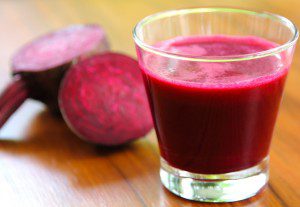By Sayer Ji
Contributing Writer for Wake Up World
Could beet juice provide you a brain boost superior to coffee or tea?
Recently, Deanna Minich, PhD, founder of Food and Spirit, brought to my attention an amazing new study on beets and their role in promoting cognitive health. She summarized the study as follows:
“One recent study in 40 healthy people showed that they were able to better perform on cognitive tests 90 minutes after drinking 450 mL beetroot juice compared with placebo (apple/blackcurrant juice, which is low in nitrates). What I really like about this study is that brain performance can be improved fairly rapidly in healthy people with a simple activity like drinking beetroot juice (high in dietary nitrates, which leads to more nitric oxide to open up oxygen flow in the brain).”
The abstract below goes into greater depth as to the plausible mechanism behind beet juice’s observed beneficial effects:
“Nitrate derived from vegetables is consumed as part of a normal diet and is reduced endogenously via nitrite to nitric oxide. It has been shown to improve endothelial function, reduce blood pressure and the oxygen cost of sub-maximal exercise, and increase regional perfusion in the brain. The current study assessed the effects of dietary nitrate on cognitive performance and prefrontal cortex cerebral blood-flow (CBF) parameters in healthy adults.
“In this randomised, double-blind, placebo-controlled, parallel-groups study, 40 healthy adults received either placebo or 450ml beetroot juice (~5.5mmol nitrate). Following a 90minute drink/absorption period, participants performed a selection of cognitive tasks that activate the frontal cortex for 54min. Near-Infrared Spectroscopy (NIRS) was used to monitor CBF and hemodynamics, as indexed by concentration changes in oxygenated and deoxygenated-haemoglobin, in the frontal cortex throughout. The bioconversion of nitrate to nitrite was confirmed in plasma by ozone-based chemi-luminescence. Dietary nitrate modulated the hemodynamic response to task performance, with an initial increase in CBF at the start of the task period, followed by consistent reductions during the least demanding of the three tasks utilised.
“Cognitive performance was improved on the serial 3s subtraction task. These results show that single doses of dietary nitrate can modulate the CBF response to task performance and potentially improve cognitive performance, and suggest one possible mechanism by which vegetable consumption may have beneficial effects on brain function.”
As you can see above, the beet juice intervention resulted in the modulation of haemodynamic response (HR) in the prefrontal cortex during task performance. In neurobiology the HR involves the rapid delivery of blood to active neuronal tissues. The blood vessel dilating effects of beet nitrate and subsequent increases in oxygen and nutrients may help explain the improvements in cognitive function in the intervention group.
As Deanna mentioned, it is quite amazing that a single dose of beet juice (450 mL = 15.21 ounces), could result in near immediate improvements in cognition. This bodes well for those looking for a viable option to coffee or tea, since habitual users of these stimulant beverages have come to expect immediate results. The difference here, of course, is that beets are a food and therefore can be considered a more sustainable and nourishing brain supportive agent. Additionally, beet is a nutrition-packed food carrying a wide range of side benefits, which include cardiovascular benefits, cancer prevention, and liver support. For more in depth information of beet as a functional food, read our previous article “The Health Benefits of Beets.”
A Wide Range of Natural, Evidence-Based Brain Boosters Have Been Identified
At GreenMedInfo.com we have indexed a vast swath of information on both the causes and solutions for cognitive dysfunction. You can view the entire data set here: Cognitive Dysfunction.
A few of the the approaches that stand out are:
-
Ginkgo Biloba
-
Coconut Oil
-
Turmeric
-
Pomegranate Juice
-
Avoid Wheat
For additional research, consult this article: “7 Proven Ways To Keep Your Brain Young,” or consult GreenMedInfo’s database section: Aging Brain.
Recommended articles by Sayer Ji:
- Brain Regeneration: Why It’s Real and How To Do It
- Research: Garlic is an Effective Natural Treatment for Heart Disease
- Wi-Fi Devices Increase Mercury Release From Dental Amalgams
- “Killer Germs” Obliterated by Medicinal Smoke Smudging, Study Reveals
- Turmeric’s ‘Smart Kill’ Properties Put Chemo & Radiation To Shame
- Beet Juice Boosts Cognitive Function In One Dose
- The Amazing Healing Properties of Apples
- 6 Bodily Tissues That Can Be Regenerated Through Nutrition
- How Turmeric Can Save the Aging Brain From Dementia and Premature Death
- Toxic Algae: Causes of Florida’s Environmental Disaster Denied by Media and Authorities
About the author:
Sayer Ji is the founder of Greenmedinfo.com, a reviewer at the International Journal of Human Nutrition and Functional Medicine, Co-founder and CEO of Systome Biomed, Vice Chairman of the Board of the National Health Federation, and Steering Committee Member of the Global Non-GMO Foundation.
For more, visit GreenMedInfo.com and Facebook.com/GreenMedInfo, or sign up for GreenMedInfo’s free e-Newsletter.
© June 30th, 2015 GreenMedInfo LLC. This work is reproduced and distributed with the permission of GreenMedInfo LLC. Want to learn more from GreenMedInfo? Sign up for their newsletter here.

If you've ever found value in our articles, we'd greatly appreciate your support by purchasing Mindful Meditation Techniques for Kids - A Practical Guide for Adults to Empower Kids with the Gift of Inner Peace and Resilience for Life.
In the spirit of mindfulness, we encourage you to choose the paperback version. Delve into its pages away from screen glare and notifications, allowing yourself to fully immerse in the transformative practices within. The physical book enriches the learning process and serves as a tangible commitment to mindfulness, easily shared among family and friends.
Over the past few years, Wake Up World has faced significant online censorship, impacting our financial ability to stay online. Instead of soliciting donations, we're exploring win-win solutions with our readers to remain financially viable. Moving into book publishing, we hope to secure ongoing funds to continue our mission. With over 8,500 articles published in the past 13 years, we are committed to keeping our content free and accessible to everyone, without resorting to a paywall.








